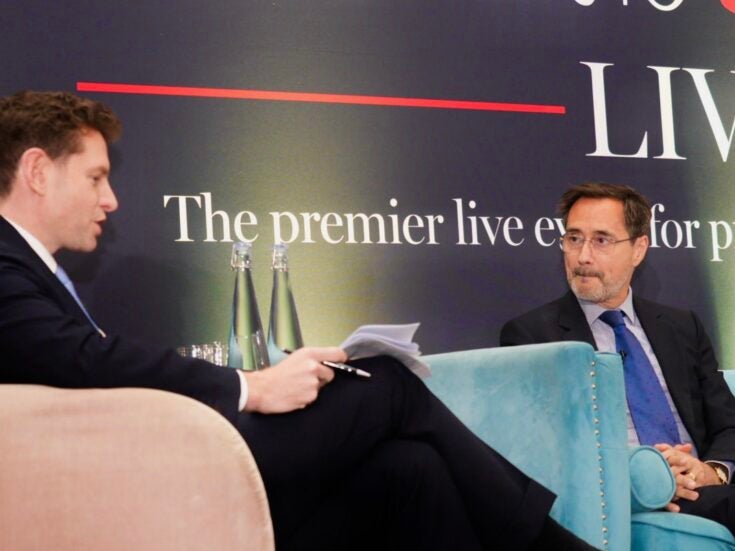
Bean Counters
Hotel Chocolat’s Peter Harris tells ICAEW’s Michael Izza how his switch from cash flows to cocoa was the sweetest of moves
IN 2005, A Hotel Chocolat customer sent co-founders Angus Thirlwell and Peter Harris a present. It was a book, a 1920 printing of Cocoa and Chocolate: Their History from Plantation to Consumer. To another confectionery company it might have been a curiosity; to Hotel Chocolat it was an inspiration.
Within a year they had bought a cocoa plantation — the Rabot Estate on St Lucia. They subsequently opened a hotel overlooking the Piton mountains and launched a restaurant offering ‘Cacao Cuisine’. Peter says he knew they had to own the plantation the second he saw it. Meeting him in his Hertfordshire HQ, it becomes clear that the story of the Rabot Estate illustrates the qualities that have made this business thrive.

In a quarter-century of trading, Peter and Angus, business partners since 1988, have posted a loss only once. The business acumen comes as no surprise — Peter qualified as a chartered accountant and is a member of the ICAEW (Institute of Chartered Accountants in England and Wales). Why did he train in accountancy?
‘It was my alternative to a degree,’ Peter explains. He was encouraged, he says, by a family friend. Offered career advice ‘sitting by the swimming pool in the rather nice garden of a rather nice house’, he thought he’d better take it, and became an articled clerk.
He has clearly passed on the advice: his son has followed in his footsteps and recently qualified. The ICAEW tells students that qualifying can lead anywhere; ‘chocolatier’ is a welcome addition.
Peter and Angus started the Mint Marketing Company in 1988. Having worked together before, they knew they would make good colleagues: ‘It wasn’t going to be one of those companies where two friends start a business and fall out after a year.’
Corporate mints and chocolates were complemented by consumer chocolate delivery and in 1993 Chocexpress launched ‘chocograms’ which were sent all over Britain. But after many years some surprising responses (‘I didn’t realise your chocolates were so good!’) persuaded them a name change was required to reflect the quality, and in 2003 Hotel Chocolat was born.
It also presented an opportunity to re-focus ‘on our three key tenets: innovation, authenticity, and ethics’. The first retail shop was tested in Watford — ‘We didn’t want to open in Cambridge and have people coming in because they felt sorry for the local boys’ — and its success prompted a second in Milton Keynes.

And that one, in Peter’s words, ‘just flew’. From then, they’ve opened five to ten stores each year. Chocolate manufacturing started in Cambridgeshire in 2007.
THE JOURNEY FROM manufacturer to grower is fascinating. Hotel Chocolat went to St Lucia offering local farmers above the market price for their cocoa. They offered seedlings to help farmers increase their crops. Now ‘St Lucian chocolate’ is available in Hotel Chocolat shops and this has re-invigorated cocoa growing on the island.
Peter is clear that from the beginning they would only operate overseas in the same ethical and sustainable way that had built success in the UK: ‘To us, our customers and the culture of our business are the most important things.’ They now buy cocoa from 150 local farmers, plus produce for the hotel. Prince Charles visited the Rabot Estate in 2008, fascinated by their ethical and sustainable approach.
The company now has outlets in Europe and the US. International companies’ tax avoidance has been a huge story recently, so what is Peter’s view? ‘We pay our taxes. I want to be able to walk down the street knowing I’ve paid my fair share. As a business owner, it is also rewarding to know that I’ve created jobs, people who pay taxes and spend in the local economy.’
However, he says, government is neither sending out the right messages nor supporting SMEs. He cites business rates: ‘Businesses are taking on leases paying £100,000 a year in rent and the taxman comes along wanting his cut based on out-of-date rental valuations. Then they charge you stamp duty land tax (SDLT) on a shop lease that isn’t an asset, but a liability.’
In 2010, Hotel Chocolat launched ‘chocolate bonds’, where loyal customers could invest in the company’s future and take their monthly yield in product — ostensibly a clear win all round. ‘We raised £4 million but HMRC hit us with a hefty tax bill.’
What does he think about the government’s attitude to SMEs? ‘It would be easier if they took the ball and chain off your ankle.’ When he worked as an accountant, he points out, companies were allowed 100 per cent first-year capital allowances — a great way to encourage re-investment.
Nevertheless, he is confident about the future. They have opened six shops in the past six months, including Copenhagen, Aberdeen, King’s Cross and Waterloo. There is talk of a luxury restaurant in London, serving Cacao Cuisine. The company has come a long way from a mint and mail-order business, constantly innovating. They must have had some government help, I say.
Peter smiles: ‘I think, when Lord Mandelson was business secretary, he spent a tenner in our Victoria store once.’
Don’t miss out on the best of Spear’s articles – sign up to the Spear’s weekly newsletter
[related_companies]





